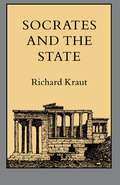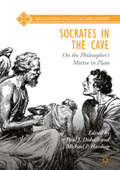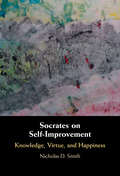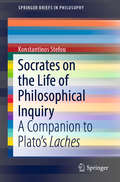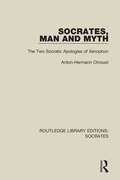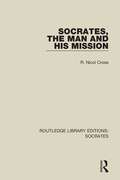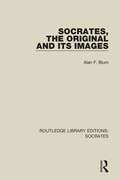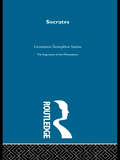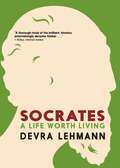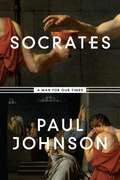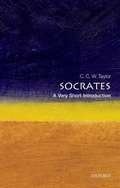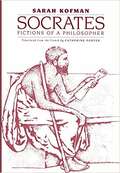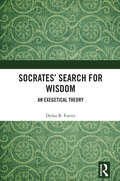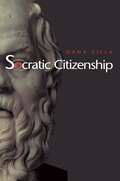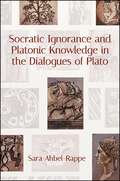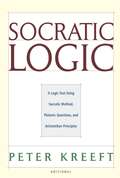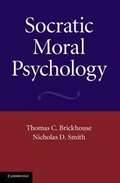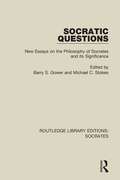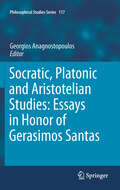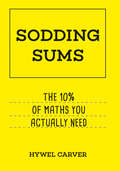- Table View
- List View
Socrates and the State
by Richard KrautThis fresh outlook on Socrates' political philosophy in Plato's early dialogues argues that it is both more subtle and less authoritarian than has been supposed. Focusing on the Crito, Richard Kraut shows that Plato explains Socrates' refusal to escape from jail and his acceptance of the death penalty as arising not from a philosophy that requires blind obedience to every legal command but from a highly balanced compromise between the state and the citizen. In addition, Professor Kraut contends that our contemporary notions of civil disobedience and generalization arguments are not present in this dialogue.
Socrates in Love: Philosophy for a Passionate Heart
by Christopher Phillips"[Phillips takes] philosophy out of the ivory tower and into the street."--Los Angeles Times Christopher Phillips goes to the heart of philosophy and Socratic discourse to discover what we're all looking for: the kind of love that makes life worthwhile. That is, love not defined only as eros, or erotic love, but in all its classical varieties. Love of neighbor, love of country, love of God, love of life, and love of wisdom--each is clarified and invigorated in Phillips's Socratic dialogues with people from all walks of life and from all over the world.
Socrates in the Cave: On The Philosopher's Motive In Plato (Recovering Political Philosophy)
by Paul J. Diduch Michael P. HardingThis book addresses the problem of fully explaining Socrates’ motives for philosophic interlocution in Plato’s dialogues. Why, for instance, does Socrates talk to many philosophically immature and seemingly incapable interlocutors? Are his motives in these cases moral, prudential, erotic, pedagogic, or intellectual? In any one case, can Socrates’ reasons for engaging an unlikely interlocutor be explained fully on the grounds of intellectual self-interest (i.e., the promise of advancing his own wisdom)? Or does his activity, including his self-presentation and staging of his death, require additional motives for adequate explanation? Finally, how, if at all, does our conception of Socrates’ motives help illuminate our understanding of the life of reason as Plato presents it? By inviting a multitude of authors to contribute their thoughts on these question—all of whom share a commitment to close reading, but by no means agree on the meaning of Plato’s dialogues—this book provides the reader with an excellent map of the terrain of these problems and aims to help the student of Plato clarify the tensions involved, showing especially how each major stance on Socrates entails problematic assumptions that prompt further critical reflection.
Socrates on Self-Improvement: Knowledge, Virtue, and Happiness
by Nicholas D. SmithWhat model of knowledge does Plato's Socrates use? In this book, Nicholas D. Smith argues that it is akin to knowledge of a craft which is acquired by degrees, rather than straightforward knowledge of facts. He contends that a failure to recognize and identify this model, and attempts to ground ethical success in contemporary accounts of propositional or informational knowledge, have led to distortions of Socrates' philosophical mission to improve himself and others in the domain of practical ethics. He shows that the model of craft-knowledge makes sense of a number of issues scholars have struggled to understand, and makes a case for attributing to Socrates a very sophisticated and plausible view of the improvability of the human condition.
Socrates on Trial
by A. D. IrvineMore than 2,400 years after his death, Socrates remains an iconic but controversial figure. To his followers, he personified progressive Greek ideals of justice and wisdom. To his detractors, he was a corruptor of the young during wartime and one of the reasons Athens had suffered a humiliating defeat to Sparta in 404 BC. Socrates' story is one of historic proportions and his unyielding pursuit of truth remains controversial and relevant to the present day.Socrates on Trial presents the story of Socrates as told to us by Aristophanes, Plato, Xenophon, and others. The play uses fresh language to emphasize what is important in the works of these ancient authors, while at the same time remaining faithful to the general tenor and tone of their writings. Andrew Irvine has created a script that not only fits comfortably into the space of a single theatrical performance, but is also informative and entertaining. Suited for informal dramatic readings as well as regular theatrical performances, Socrates on Trial will undoubtedly appeal to instructors and students, and its informative introduction enhances its value as a resource.Complete with production and classroom notes, this modern recasting of the Socrates story will make riveting reading both inside and outside the classroom.
Socrates on the Life of Philosophical Inquiry: A Companion to Plato’s Laches (SpringerBriefs in Philosophy)
by Konstantinos StefouThis book offers the first systematic reading of Plato’s Laches in English after three decades of scholarly silence. It rekindles interest in this much-neglected dialogue by providing a fresh discussion of the major issues that arise from the text. Among these issues, pride of place is taken by the virtue of courage, for the definition of which Socrates is depicted as engaging in some long-winded dialectical exchange with his interlocutors. Yet, although there is no room for doubt that the Laches is Plato’s most explicit treatment of courage, this dialogue ends in perplexity and is thus traditionally thought of as an unsuccessful attempt to define what courage is. The present study challenges this suggestion. This book proposes a new paradigm for the interpretation of Plato’s Laches. In fact, it constitutes the first systematic attempt to study the dialogue in light of the idea that its composition could well have formed part of Plato’s overall plan to establish a well-defined and rigorous justification of the life of philosophical inquiry The book will be of key interest to classicists, philosophers, and intellectual historians, but will also appeal to students or anyone interested in ancient Greek philosophy.
Socrates' Daimonic Art
by Elizabeth S. BelfioreDespite increasing interest in the figure of Socrates and in love in ancient Greece, no recent monograph studies these topics in all four of Plato's dialogues on love and friendship. This book provides important new insights into these subjects by examining Plato's characterization of Socrates in Symposium, Phaedrus, Lysis and the often neglected Alcibiades I. It focuses on the specific ways in which the philosopher searches for wisdom together with his young interlocutors, using an art that is 'erotic', not in a narrowly sexual sense, but because it shares characteristics attributed to the daimon Eros in Symposium. In all four dialogues, Socrates' art enables him, like Eros, to search for the beauty and wisdom he recognizes that he lacks and to help others seek these same objects of erôs. Belfiore examines the dialogues as both philosophical and dramatic works, and considers many connections with Greek culture, including poetry and theater.
Socrates, Man and Myth: The Two Socratic Apologies of Xenophon (Routledge Library Editions: Socrates #2)
by Anton-Hermann ChroustThe purpose of this book, first published in 1957, is to make a critical analysis of the controversial Socratic problem. The Socratic issue owes its paramount difficulty not only to the status of available source materials, but also to the diversity of opinion as to the proper use of these materials. This volume offers a new approach to the problem, and a starting point to further investigations.
Socrates, The Man and His Mission (Routledge Library Editions: Socrates #3)
by R. Nicol CrossThis book, first published in 1914, examines the life of Socrates and his teaching, and also details the world in which he lived, the Greece of the time experiencing a breakdown of authority in religion, morality and society.
Socrates, The Original and its Images (Routledge Library Editions: Socrates #4)
by Alan F. BlumThis book, first published in 1978, is a radical approach to the philosophical distinction between Being and beings, in which the life of Socrates is used as the metaphor for the theoretical life, in contrast to the continuous historical interest in that life as an object for biographical reconstruction and description. Professor Blum’s main concern is to develop a story that coordinates stages of the theoretical life to practices which exemplify man’s ideal relationship with language.
Socrates-Arg Philosophers (Arguments Of The Philosophers Ser.)
by Gerasimos Xenophon SantasFirst Published in 1999. Routledge is an imprint of Taylor & Francis, an informa company.
Socrates: A Life Worth Living (Philosophy for Young People)
by Devra LehmannA lively and accessible introduction to the quintessential philosopher, and the civilized world&’s first enemy of the state. Socrates: A Life Worth Living traces the life and ideas of one of Western Civilization&’s founding philosophers, whose influence is still felt more than two thousand years later. Socrates is famous for how he died, executed by the Athenian government for corrupting the youth of Athens, but his most important contribution was to challenge the people around him to test their ideas and beliefs in conversation with each other, in the belief that in this way we could become a society that knows the difference between truth and falsehood, and find what makes a life worthwhile. He did not claim to have definitive answers, but he knew that knowledge was the key to finding them, and he invited everyone he met to join him in his quest. The Socratic Method is the first, and still the best, method for distinguishing truth from falsehood. In Socrates: A Life Worth Living, award-winning author Devra Lehmann gives us the first biography for young readers of the thinker who has seen no equal.
Socrates: A Man for Our Times
by Paul Johnson"Spectacular . . . A delight to read." --The Wall Street Journal From bestselling biographer and historian Paul Johnson, a brilliant portrait of Socrates, the founding father of philosophy In his highly acclaimed style, historian Paul Johnson masterfully disentangles centuries of scarce sources to offer a riveting account of Socrates, who is often hailed as the most important thinker of all time. Johnson provides a compelling picture of Athens in the fifth century BCE, and of the people Socrates reciprocally delighted in, as well as many enlightening and intimate analyses of specific aspects of his personality. Enchantingly portraying "the sheer power of Socrates's mind, and its unique combination of steel, subtlety, and frivolity," Paul Johnson captures the vast and intriguing life of a man who did nothing less than supply the basic apparatus of the human mind.
Socrates: A Very Short Introduction
by Christopher TaylorSocrates has a unique position in the history of philosophy. On the one hand he is one of the most influential of all philosophers, and on the other one of the most elusive and least known. Further, his historical influence is not itself independent of his elusiveness.
Socrates: Fictions of a Philosopher
by Sarah Kofman<p>Socrates is an elusive figure, Sarah Kofman asserts, and he is necessarily so since he did not write or directly state his beliefs. "With Socrates," she writes in her introduction, "we will never leave fiction behind." Kofman suggests that Socrates's avowal of ignorance was meant to be ironic. Later philosophers who interpreted his text invariably resisted the profoundly ironic character of his way of life and diverged widely in their interpretations of him. Kofman focuses especially on the views of Plato, Hegel, Kierkegaard, and Nietzsche. <p>The information that is available about Socrates's life is paradoxical. He was famously ugly, but he was also a notorious seducer of youth. His sexuality is ambiguous, according to Kofman, for his allure is stereotypically feminine. His death is also subject to varied interpretation. Some commentators regard him as a redemptive, proto-Christ figure, more Jewish than Greek, and others see him as an archetypal Stoic hero. Despite radically different interpretations, Plato, Hegel, Kierkegaard, and Nietzsche all found Socrates to be a dominant figure of immense importance in the history of philosophy. Kierkegaard and Nietzsche try to retain the idea of irony as essential to the Socratic way of life. Hegel, in contrast, insists that Socrates be assigned one particular place in the historical development of Absolute Spirit. While Kierkegaard considered Socratic irony as an intellectual position, Nietzsche recognized and resisted Socrates's irony as a predisposition. In examining each philospher's response to Socratic irony, Kofman draws specifically on the history of philosophy and psychoanalytic theory.</p>
Socrates’ Search for Wisdom: An Exegetical Theory
by Dylan B. FutterSocrates urges us to examine our lives, but what exactly does that mean? Should we question our moral convictions, or construct theories of virtue and the good? This book argues for a third path: the best human life is one of moral learning, in which we actualise our potential for wisdom.Readers will gain a fresh perspective on the Socratic method—not as mere argument, but as a process of inquiry. The author develops an exegetical model of dialogue and shows its fidelity to Plato’s texts. He then situates this model in the scholarly literature and uses it to clarify several puzzling features of Socrates’ approach. The result is a deeper understanding of Socrates’ method and his philosophical life.Socrates’ Search for Wisdom: An Exegetical Theory will appeal to scholars, students of Greek philosophy, and general readers, continuing the Socratic tradition of engaging specialists and non-specialists alike.
Socratic Citizenship
by Dana VillaMany critics bemoan the lack of civic engagement in America. Tocqueville's ''nation of joiners'' seems to have become a nation of alienated individuals, disinclined to fulfill the obligations of citizenship or the responsibilities of self-government. In response, the critics urge community involvement and renewed education in the civic virtues. But what kind of civic engagement do we want, and what sort of citizenship should we encourage? In Socratic Citizenship, Dana Villa takes issue with those who would reduce citizenship to community involvement or to political participation for its own sake. He argues that we need to place more value on a form of conscientious, moderately alienated citizenship invented by Socrates, one that is critical in orientation and dissident in practice. Taking Plato's Apology of Socrates as his starting point, Villa argues that Socrates was the first to show, in his words and deeds, how moral and intellectual integrity can go hand in hand, and how they can constitute importantly civic--and not just philosophical or moral--virtues. More specifically, Socrates urged that good citizens should value this sort of integrity more highly than such apparent virtues as patriotism, political participation, piety, and unwavering obedience to the law. Yet Socrates' radical redefinition of citizenship has had relatively little influence on Western political thought. Villa considers how the Socratic idea of the thinking citizen is treated by five of the most influential political thinkers of the past two centuries--John Stuart Mill, Friedrich Nietzsche, Max Weber, Hannah Arendt, and Leo Strauss. In doing so, he not only deepens our understanding of these thinkers' work and of modern ideas of citizenship, he also shows how the fragile Socratic idea of citizenship has been lost through a persistent devaluation of independent thought and action in public life. Engaging current debates among political and social theorists, this insightful book shows how we must reconceive the idea of good citizenship if we are to begin to address the shaky fundamentals of civic culture in America today.
Socratic Ignorance and Platonic Knowledge in the Dialogues of Plato (SUNY series in Western Esoteric Traditions)
by Sara Ahbel-RappeIn this highly original and provocative book, Sara Ahbel-Rappe argues that the Platonic dialogues contain an esoteric Socrates who signifies a profound commitment to self-knowledge and whose appearances in the dialogues are meant to foster the practice of self-inquiry. According to Ahbel-Rappe, the elenchus, or inner examination, and the thesis that virtue is knowledge, are tools for a contemplative practice that teaches us how to investigate the mind and its objects directly. In other words, the Socratic persona of the dialogues represents wisdom, which is distinct from and serves as the larger space in which Platonic knowledge—ethics, epistemology, and metaphysics—is constructed. Ahbel-Rappe offers complete readings of the Apology, Charmides, Alcibiades I, Euthyphro, Lysis, Phaedrus, Theaetetus, and Parmenides, as well as parts of the Republic. Her interpretation challenges two common approaches to the figure of Socrates: the thesis that the dialogues represent an "early" Plato who later disavows his reliance on Socratic wisdom, and the thesis that Socratic ethics can best be expressed by the construct of eudaimonism or egoism.
Socratic Logic: Socratic Method Platonic Questions
by Peter Kreeft Trent DoughertyThis new and revised edition of Peter Kreeft's Socratic Logic is updated, adding new exercises and more complete examples, all with Kreeft's characteristic clarity and wit. Since its introduction in the spring of 2004, Socratic Logic has proven to be a different type of logic text: <P><P> (1) This is the only complete system of classical Aristotelian logic in print. The "old logic" is still the natural logic of the four language arts (reading, writing, speaking, and listening). Symbolic, or "mathematical," logic is not for the humanities. (How often have you heard someone argue in symbolic logic?) <P><P> (2) This book is simple and user-friendly. It is highly interactive, with a plethora of exercises and a light, engaging style. <P><P> (3) It is practical. It is designed for do-it-yourselfers as well as classrooms. It emphasizes topics in proportion to probable student use: e.g., interpreting ordinary language, not only analyzing but also constructing effective arguments, smoking out hidden assumptions, making "argument maps," and using Socratic method in various circumstances. <P><P> (4) It is philosophical. Its exercises expose students to many classical quotations, and additional chapters introduce philosophical issues in a Socratic manner and from a commonsense, realistic point of view. It prepares students for reading Great Books rather than Dick and Jane, and models Socrates as the beginner’s ideal teacher and philosopher.
Socratic Moral Psychology
by Thomas C. Brickhouse Nicholas D. SmithSocrates' moral psychology is widely thought to be 'intellectualist' in the sense that, for Socrates, every ethical failure to do what is best is exclusively the result of some cognitive failure to apprehend what is best. Until fairly recently, the view that, for Socrates, emotions and desires have no role to play in causing such failure went unchallenged. This book argues against the orthodox view of Socratic intellectualism and offers in its place a comprehensive alternative account that explains why Socrates believed that emotions, desires and appetites can influence human motivation and lead to error. Thomas C. Brickhouse and Nicholas D. Smith defend the study of Socrates' philosophy and offer a new interpretation of Socratic moral psychology. Their novel account of Socrates' conception of virtue and how it is acquired shows that Socratic moral psychology is considerably more sophisticated than scholars have supposed.
Socratic Questions: New Essays on the Philosophy of Socrates and its Significance (Routledge Library Editions: Socrates #5)
by Barry S. Gower Michael C. StokesThis book, first published in 1992, introduces some of Socrates’ problems and some of the problems about him. It seeks at the same time to advance new views, arguments and information on Socrates’ mission, techniques, ethics and later reception. From civil disobedience to ethics, this collection provides stimulating discussions of Socrates’ life, thought and historical significance.
Socratic and Platonic Political Philosophy
by Christopher P. LongIn the Gorgias, Socrates claims to practice the true art of politics, but the peculiar politics he practices involves cultivating in each individual he encounters an erotic desire to live a life animated by the ideals of justice, beauty and the good. Socratic and Platonic Political Philosophy demonstrates that what Socrates sought to do with those he encountered, Platonic writing attempts to do with readers. Christopher P. Long's attentive readings of the Protagoras, Gorgias, Phaedo, Apology, and Phaedrus invite us to cultivate the habits of thinking and responding that mark the practices of both Socratic and Platonic politics. Platonic political writing is here experienced in a new way as the contours of a politics of reading emerges in which the community of readers is called to consider how a commitment to speaking the truth and acting toward justice can enrich our lives together.
Socratic, Platonic and Aristotelian Studies: Essays in Honor of Gerasimos Santas
by Georgios AnagnostopoulosThis volume contains outstanding studies by some of the best scholars in ancient Greek Philosophy on key topics in Socratic, Platonic, and Aristotelian thought. These studies provide rigorous analyses of arguments and texts and often advance original interpretations. The essays in the volume range over a number of central themes in ancient philosophy, such as Socratic and Platonic conceptions of philosophical method; the Socratic paradoxes; Plato's view on justice; the nature of Platonic Forms, especially the Form of the Good; Aristotle's views on the faculties of the soul; Aristotle's functionalist account of the human good; Socratic, Platonic, and Aristotelian views on the nature of desire and its object. The volume will be of interest to students and scholars of ancient philosophy and classics.
Sodding Sums: The 10% of maths you actually need
by Hywel CarverMaths is a part of everyday life and there's no denying it. For anyone who has blocked distant memories of complicated algebraic formulae or incomprehensible trigonometry, numbers can strike fear at your very core. It is, however, an unavoidable part of life, so why struggle through without a clue? Hywel Carver is passionate about making maths approachable for everyone. In his go-to guide he introduces handy arithme`tricks' that help solve multiplication and division problems with rounding and approximations; explains fractions, percentages and ratios, how to convert between them and understand increases, decreases and multiplication; delves into all types of conversions - metric versus imperial, Celsius to Fahrenheit, as well as distances and speeds. These mathematical theories can then be applied to common conundrums, such as how mortgages and loans actually work, grasping an understanding of compound interest, the chances and probability of success in gambling games, and how to analyse statistics and data including causality, coincidence and correlation. Sodding Sums will subtract stress and divide difficulty so you no longer feel clueless when challenged by maths.
Sodding Sums: The 10% of maths you actually need
by Hywel CarverMaths is a part of everyday life and there's no denying it. For anyone who has blocked distant memories of complicated algebraic formulae or incomprehensible trigonometry, numbers can strike fear at your very core. It is, however, an unavoidable part of life, so why struggle through without a clue? Hywel Carver is passionate about making maths approachable for everyone. In his go-to guide he introduces handy arithme`tricks' that help solve multiplication and division problems with rounding and approximations; explains fractions, percentages and ratios, how to convert between them and understand increases, decreases and multiplication; delves into all types of conversions - metric versus imperial, Celsius to Fahrenheit, as well as distances and speeds. These mathematical theories can then be applied to common conundrums, such as how mortgages and loans actually work, grasping an understanding of compound interest, the chances and probability of success in gambling games, and how to analyse statistics and data including causality, coincidence and correlation. Sodding Sums will subtract stress and divide difficulty so you no longer feel clueless when challenged by maths.
